Over 68% of online customer journeys begin with a search engine, yet most UK businesses unknowingly lose visibility because of hidden technical issues. These are not obvious design flaws or weak content; they are the invisible problems like slow loading times, poor mobile performance, indexing errors, and missing structured data that stop Google from ranking your site properly. If your organic traffic has stalled, your pages are not appearing in search, or leads are down despite good content, chances are your technical SEO is holding you back.
In this guide, you will learn exactly what technical SEO is, how it affects your rankings, and what UK businesses need to fix for better performance. We will break down the most common technical SEO issues, what a full audit includes, and how expert-led technical SEO services UK can unlock faster load times, improved visibility, and long-term search growth. Understanding this could fundamentally change how your site performs and how your business grows.
Table of Contents
What Is Technical SEO and Why Do UK Businesses Need It?
According to Ofcom, 94% of UK adults now access the internet daily, and most start on mobile. Technical SEO is the foundation of your website’s performance in search. It ensures your site is structured in a way that allows search engines like Google to efficiently crawl, index, and understand your content.
While on-page SEO focuses on optimising visible elements like headlines and keywords, technical SEO handles everything under the hood, from site speed and mobile responsiveness to crawl paths, structured data, and security.
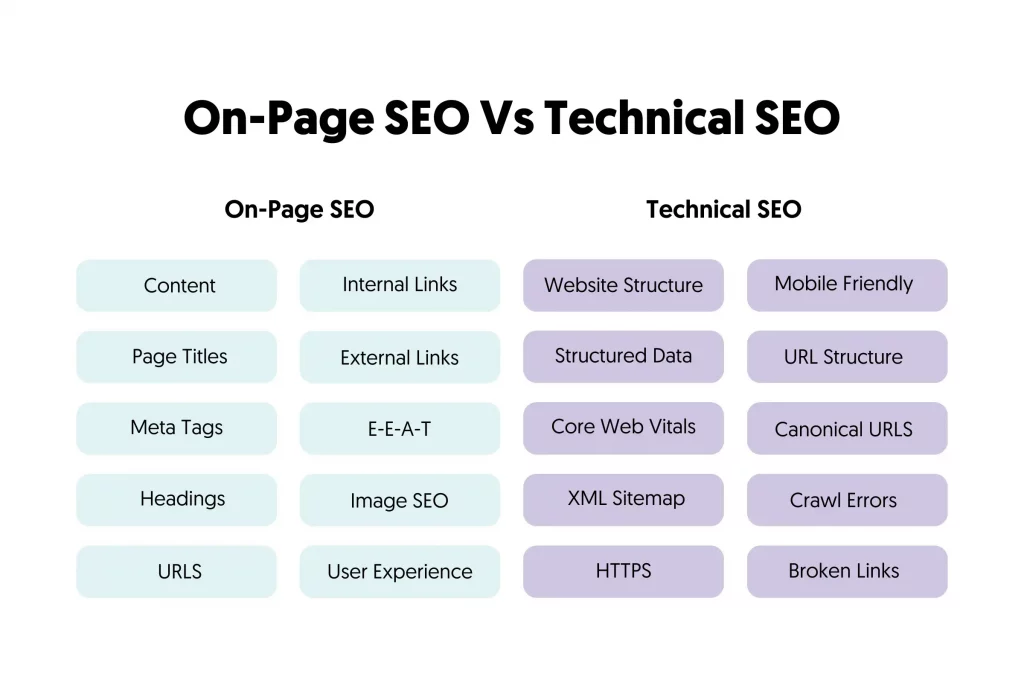
For UK businesses in competitive markets, this isn’t a nice-to-have; it’s mission-critical. A slow-loading site or indexing errors can quietly kill your rankings, no matter how strong your offering is. That’s why our technical SEO services UK are designed to solve these hidden problems at the source. By improving Core Web Vitals, fixing crawlability issues, and implementing structured data, we help your site load faster, rank higher, and perform better for both users and search engines.
According to Google’s own SEO Starter Guide, technical site quality is one of the most important ranking signals. If you’re serious about long-term growth, technical SEO isn’t optional; it’s the framework on which your success depends.
How Do Technical SEO Services Work in the UK?
Technical SEO services in the UK are about more than clean code. They’re about understanding local user behaviour, mobile-first expectations, and UK search engine trust signals. Google UK and Bing UK, for example, weigh mobile performance and local domain relevance as ranking factors.
And here’s the reality: UK online audiences are less tolerant of slow, confusing sites. If your site loads slowly or feels clunky on mobile, your bounce rate will rise, and your rankings will drop.
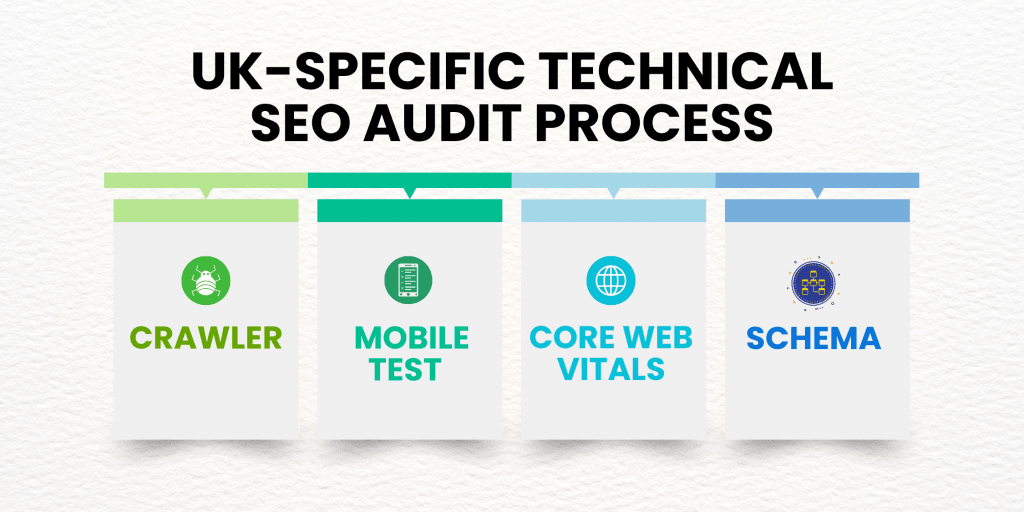
A comprehensive technical SEO audit includes:
- Crawlability – Can search engines easily access and navigate your site? Poor crawl paths or blocked resources stop your best pages from getting seen.
- Indexation – Are your high-value pages actually in Google’s index? Or are low-priority pages wasting crawl budget?
- Mobile Usability – With mobile-first indexing, your mobile layout, font sizes, and tap targets must be flawless.
- Structured Data (Schema Markup) – Helps search engines interpret your content and display rich results like product ratings, FAQ snippets, and more.
Pro Tip: UK businesses should always test on both desktop and mobile using PageSpeed Insights and Search Console for Core Web Vitals insights.
How to Identify Technical SEO Errors on Your Website
Most websites do not lose rankings because of bad content; they lose them because of technical errors no one sees. These hidden issues affect how search engines crawl, interpret, and trust your site. From slow page speeds to weak mobile performance and indexing failures, technical SEO problems silently drag your visibility down and keep your content buried.
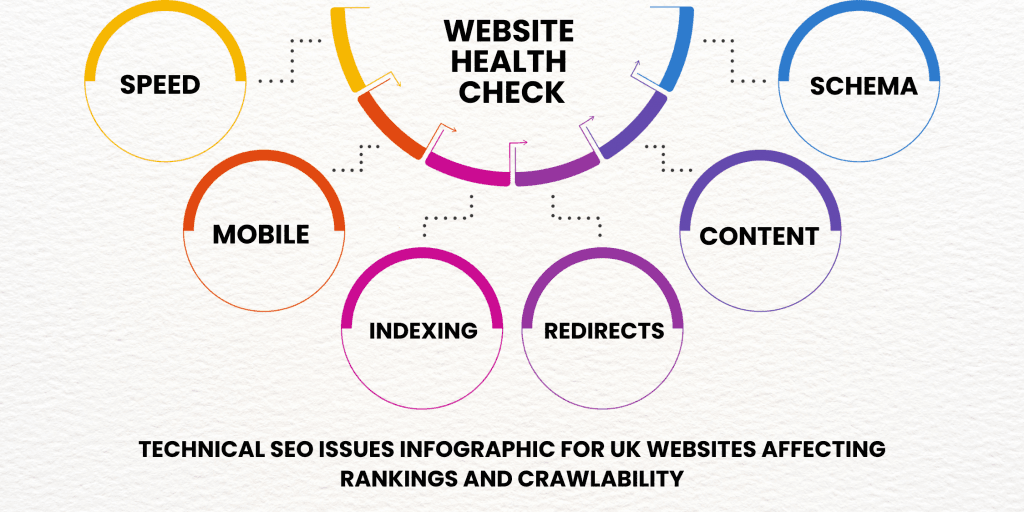
In the list below, we’ve grouped the most common technical SEO issues into key themes. Each one represents a missed opportunity, and fixing even a few can unlock noticeable gains in traffic, rankings, and conversions.
Speed and Core Web Vitals Issues
According to Google, UK users expect a page to load in under 2.5 seconds on 4G, or they’ll bounce. That’s how critical site speed and Core Web Vitals are to rankings and conversions.
Key performance issues:
- Slow Largest Contentful Paint (LCP) – Pages take too long to visually load.
- Poor First Input Delay (FID) – Site feels unresponsive when users click.
- High Cumulative Layout Shift (CLS) – Content jumps around while loading.
- Uncompressed images and bloated scripts – Common in legacy or drag-and-drop page builders.
One UK eCommerce brand improved conversions by 23% after reducing page load time by 0.5 seconds.
If your Core Web Vitals are failing, your content may never hit Page 1, no matter how good it is.
Indexing and Crawlability Errors
Google can’t rank what it can’t find. Yet, many UK websites unknowingly block search engine bots or waste crawl budget on irrelevant pages, silently damaging their rankings.
Common crawl and indexation issues:
- Poor robots.txt or noindex tags – Blocks important pages from search engines.
- Missing or broken XML sitemap – Prevents Google from discovering all your pages.
- Orphan pages – Pages with no internal links pointing to them won’t be found or crawled.
- Duplicate or thin content – Dilutes indexing signals, causing Google to deprioritise your pages.
- Wasted crawl budget – Too many redirects, parameters, or faceted filters confuse bots.
A quick test: Use the URL Inspection Tool in Google Search Console to see if your critical pages are indexed. If they’re not, or if they say “Excluded”, your site has a deeper crawlability issue.
Insight for UK sites: If you serve different regions of the UK (England, Scotland, Wales), make sure your hreflang and internal linking structure support regional variations, or Google may skip indexing those key pages altogether.
Mobile Usability Failures
In the UK, mobile traffic now accounts for over 60% of all website visits, yet many businesses still design primarily for desktop. Google’s mobile-first indexing means your mobile site is now the benchmark. If it’s clunky or broken, it damages rankings, no matter how polished your desktop version looks.
Common issues:
- Unresponsive design – Layout breaks on smaller screens.
- Overlapping text or elements – Makes content hard to read.
- Tight tap targets – Buttons are too close together or hard to click.
- Slower mobile load speed – Often from unoptimised themes or plugins.
A poor mobile experience = lower rankings and frustrated users.
Quick Check: Use the Mobile Usability report in Google Search Console to identify issues on key pages. It’s a fast, free way to spot and prioritise mobile fixes.
Broken Links, Redirect Chains, and HTTPS Conflicts
Broken pages and redirect loops aren’t just bad for user experience — they erode trust, waste crawl budget, and quietly leak your site’s authority. For UK businesses trying to compete in saturated markets, these issues can be devastating.
Critical problems to watch:
- 404 errors and dead links – Confuse both users and Google, reducing crawl efficiency.
- Redirect chains and loops – Slow down load speed and confuse bots on which URL to index.
- Mixed content errors – When secure (HTTPS) pages load insecure (HTTP) assets, browsers flag warnings.
- Improper canonicalisation after redirects – Google may index the wrong version of a page.
- Too many 301s in a row – Weakens link equity and slows page loading.
Quick tip: Use Screaming Frog (free for up to 500 URLs) to crawl your site and identify broken internal links, long redirect chains, or mixed content issues instantly.
According to Google, redirect chains longer than three hops can cause slowdowns and indexing issues. If you’re linking to a URL that already redirects twice, Google may not follow it at all.
For e-commerce sites or businesses switching from HTTP to HTTPS (especially in the UK where GDPR and security standards are tighter), broken or insecure links can lead to lost trust and lost rankings.
Duplicate Content and Poor Internal Architecture
Google doesn’t penalise duplicate content, but it does ignore it. If your site has competing or duplicate pages, cannibalisation and weak internal linking can confuse bots, dilute relevance, and suppress your visibility in search.
Key issues that silently drag down rankings:
- Duplicate or near-identical pages – Often caused by faceted filters, URL parameters, or blog tag pages.
- Poor canonical tags – Google may index the wrong version of a page, or none at all.
- Internal keyword cannibalisation – Multiple pages targeting the same query compete instead of complementing.
- Flat site architecture – When every page is three or more clicks from the homepage, crawl efficiency suffers.
- No internal linking strategy – Orphaned content and poor link distribution dilute topical authority.
Pro insight: If your UK website has paginated category pages (common in eCommerce), ensure correct rel=”next” and rel=”prev” setup or Google may treat them as separate competing pages.
Want a fast check? In Google Search Console, inspect your Coverage Report and look for “Duplicate without user-selected canonical”. It’s a sign Google’s confused and that confusion costs rankings.
Structured Data Misuse or Missing Schema
If your content doesn’t speak Google’s language, it won’t earn rich results, no matter how good it is. Structured data (schema) helps search engines understand your content better and surface it more attractively in SERPs.
Common schema-related issues:
- Missing schema markup – No rich snippets, reduced visibility, and lower CTRs.
- Incorrect or incomplete schema – Schema exists, but doesn’t follow Google’s structured data guidelines.
- Overuse of product or review schema – Spammy usage may result in manual actions.
- Lack of schema diversity – Only using basic schema like ‘Organization’ or ‘Website’ when content-specific schema (e.g., FAQs, Articles, Breadcrumbs) could boost visibility.
- No validation of schema – Many sites assume it’s working, but never test it using tools like Google’s Rich Results Test.
According to Search Engine Journal, schema can increase your organic CTR by up to 30% when implemented correctly. For UK businesses in competitive industries like finance, legal, or eCommerce, this can mean thousands in additional traffic value per month.
Pro tip: Use Schema.org to identify which markup types match your content, and validate them using Google Search Console’s Enhancements report for clean, indexable results.
How Much Do Technical SEO Services UK Cost?
Technical SEO pricing in the UK depends on a few key factors: your website’s size, platform, structure, and the number of pages requiring optimisation. Some businesses need a one-time audit to identify critical fixes. Others require ongoing support to maintain site health, track algorithm updates, and ensure long-term ranking stability. The right investment depends on your business goals, not just your budget.
Here’s a general pricing guide based on current UK market benchmarks:
- Starter Technical SEO Audit (£400–£800):
Suited for smaller brochure-style sites. Covers essentials like crawl errors, site speed, mobile usability, and indexing configuration. - Advanced Technical SEO Audit (£1,000–£3,000):
Ideal for Shopify, WooCommerce, or content-heavy sites. Includes Core Web Vitals analysis, internal linking audits, structured data review, and duplicate content resolution. - Ongoing Technical SEO Support (£500+/month):
For scaling brands that need regular audits, issue resolution, implementation, penalty recovery, and technical monitoring tied to performance KPIs.
More businesses are now opting for AI-powered technical SEO audits, which provide faster, deeper insights than manual reviews. These audits can scan thousands of URLs, detect hidden bottlenecks, and produce prioritised action plans with greater precision, saving development time and avoiding ranking loss. For UK businesses competing in fast-moving sectors, this approach offers a smarter, scalable way to protect and grow organic performance.
What Results Can You Expect from Technical SEO?
Technical SEO is one of the most strategic investments you can make in long-term organic growth. But unlike paid ads, the results aren’t always instant, and that’s a good thing. A proper technical foundation doesn’t just spike performance temporarily; it builds stability, efficiency, and ranking resilience that compounds over time.
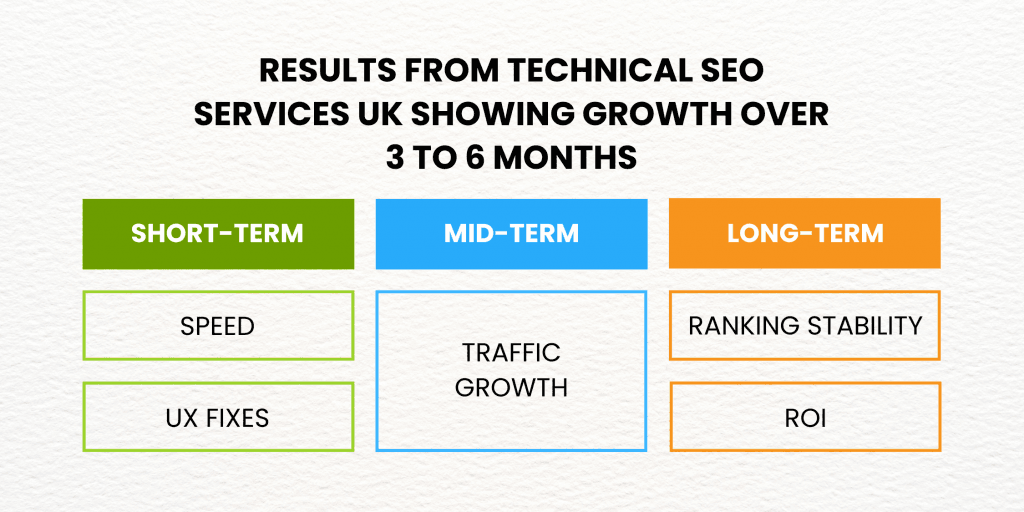
In the short term, many websites see immediate improvements in site speed, mobile performance, and indexation rates. Fixing crawl errors, broken links, and load delays can enhance user experience almost overnight and allow search engines to access your content more effectively.
In the medium term, typically between two to four months, you’ll begin to notice measurable gains in search visibility, organic traffic, and page-level rankings. As technical barriers are removed, your existing content performs better, and future content is more likely to be indexed and ranked quickly.
The long-term impact is where technical SEO becomes a true growth asset. By maintaining a fast, mobile-friendly, structurally sound website, you build ranking stability, reduce vulnerability to Google updates, and increase the ROI of every piece of content and campaign you publish. A well-optimised technical foundation turns your site from a digital brochure into a scalable performance engine.
Our Step-by-Step Technical SEO Process
Most UK business leaders don’t need a 50-page audit; they need results. What’s holding our rankings back? What’s worth fixing first? And when will we see progress?
That’s exactly what our technical SEO services UK deliver. We’ve refined our process into five key stages, designed to uncover issues quickly, fix what matters most, and help your site perform better in search from day one. Here’s how it works:
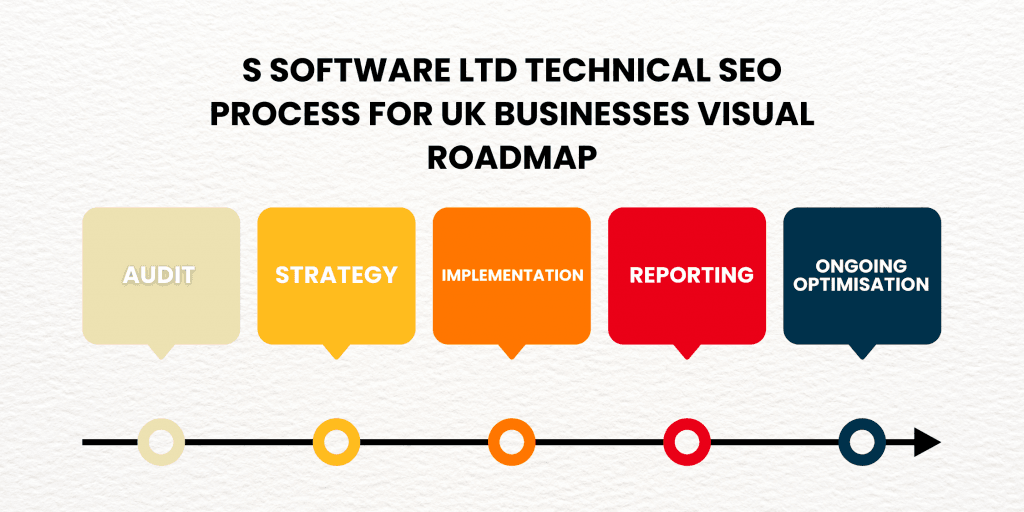
Full Site Audit with AI-Enhanced Insights
We begin by running a comprehensive crawl of your site using advanced tools and AI diagnostics. This pinpoints hidden issues that impact rankings, user experience, and crawlability.
- Diagnose crawl and indexation errors
- Analyse Core Web Vitals and page speed
- Identify broken links, redirect chains, and sitemap conflicts
- Spot duplicate content and weak canonical tags
- Validate structured data and schema markup
Customised Strategy and Fix Prioritisation
Once we’ve uncovered the issues, we build a focused action plan. Every recommendation is tailored to your platform, tech stack, and business priorities.
- Fixes prioritised by SEO impact and complexity
- Custom strategy for your CMS (Shopify, WordPress, etc.)
- Clear next steps to avoid wasting dev time
- Aligned with both commercial goals and organic growth
Expert Implementation and Monitoring
We don’t leave you with a list of problems. Our SEO specialists and developers get to work, implementing, testing, and tracking each fix until it’s live and effective.
- Deploy technical fixes (schema, redirects, robots.txt, etc.)
- Optimise internal linking and crawl flow
- Improve Core Web Vitals performance
- Monitor results via Google Search Console and real user data
Transparent Reporting and Ongoing Optimisation
No smoke and mirrors. We give you simple, results-driven reporting that shows what was fixed, how your site has improved, and what’s next.
- Task-by-task reporting tied to SEO KPIs
- Optional live dashboard access
- Regular check-ins to surface new technical issues
- Ongoing improvements based on fresh crawl data
Google Penalty Recovery and Algorithm Protection
If your site has been hit by a drop in rankings, we help you recover and, more importantly, we build future-proof systems to prevent it from happening again.
- Audit for algorithm penalties or manual actions
- Identify thin content, spammy links, or crawl errors
- Recover visibility lost to Google updates
- Implement safe, scalable technical SEO foundations
Technical SEO for Shopify, WordPress, and Custom CMS
Not all websites are built the same, and neither are their technical SEO challenges. Whether you’re running an eCommerce site on Shopify, a high-content blog on WordPress, or a fully bespoke CMS, the truth is this: your platform shapes your SEO performance more than you think.
That’s why our technical SEO services UK are engineered to adapt, with tailored strategies backed by platform-specific expertise. Explore how we optimise for each CMS and system:
How Does Technical SEO Work for Shopify Sites?
Shopify is powerful, but it’s not perfect. We help you overcome the SEO limitations built into its Liquid theme architecture and app-heavy ecosystem.
- Fix duplicate content from product and collection URLs using Shopify Plus customisation
- Optimise for faster load speeds and pass Core Web Vitals with precision fixes
- Add and test structured data for rich product snippets
- Improve crawl depth caused by filtered navigation and faceted search
- Remove unnecessary app-generated pages that bloat your XML sitemap
Want to know if Shopify Plus vs Shopify makes a difference in your technical SEO potential? Please check our dedicated guide.
What Are the Common Technical SEO Challenges with WordPress?
With its endless plugins and template variety, WordPress often becomes a slow, inefficient SEO environment. We bring control back to your build.
- Audit and remove plugin overload that slows down rendering
- Restructure archives, tags, and paginated URLs to improve crawl flow
- Implement schema with Rank Math or Yoast, configured correctly (see On-Page SEO best practices)
- Set canonical tags to avoid duplicate taxonomy pages
- Improve your CLS, LCP, and mobile usability to align with Google’s PageSpeed Insights
We’ve worked with dozens of UK brands stuck in WordPress traps and helped them rank higher by fixing what plugins can’t.
Optimising Custom CMS: Unique Technical SEO Approaches
Have a headless CMS? Something built in-house? These systems often escape standard audit tools, and that’s exactly where we shine.
- Map site architecture manually to avoid crawl dead zones
- Set up robots.txt and sitemap.xml for clean indexation (Google Search Central Guide)
- Inject structured data using JSON-LD, validated via Schema.org
- Work alongside your devs to implement SEO-friendly components
- Protect your platform from crawl budget waste and schema conflicts
Need a CMS-agnostic SEO team that knows how to diagnose and fix even the most obscure issues? Talk to us, or explore how our AI-powered SEO audits speed up results.
Why Choose S Software Ltd for Technical SEO Services UK
Most agencies offer technical SEO as a checklist; we treat it as a growth engine. At S Software Ltd, technical SEO isn’t just about fixing errors, it’s about unlocking your site’s full ranking potential and keeping you future-ready in a search landscape that changes fast.
What makes us different? We combine AI-powered insights, deep knowledge of UK search behaviour, and a human-led strategy tailored to your platform, whether you’re on Shopify, WordPress, or a custom CMS. Every fix we recommend has one goal: to improve your traffic, rankings, and ROI faster.
Here’s how we deliver results that other agencies miss:
Why is AI Precision Important in Technical SEO?
Most audits are surface-level or overwhelming. Ours are neither.
We use AI-powered diagnostics to uncover critical ranking issues, then apply expert thinking to prioritise what matters for your business.
- Eliminate hidden crawl blockers, speed lags, and schema errors fast
- Focus only on fixes that drive traffic, conversions, and rankings
- Combine automation with real SEO expertise for better decisions
Want to see how AI changes the game? Explore AI-Powered SEO
Why Choose a UK-Based Technical SEO Agency?
Your site doesn’t compete globally; it competes right here in the UK. Our strategies are built for British search behaviour, local regulations, and region-specific expectations.
- Optimise for UK search intent and conversion habits
- Align technical SEO with GDPR, UK Core Web Vitals benchmarks, and hosting speed
- Dedicated UK-based strategist, no handoffs, no misalignment
Need your Shopify or WordPress site to rank locally? See our Shopify Plus Development expertise
SEO Foundations That Scale With You
Fixing today’s problems is easy. Building a system that stays strong tomorrow? That’s what we do best. We future-proof your website’s technical health to adapt with every algorithm update and business shift.
- Protect rankings from traffic drops and technical regressions
- Build scalable architecture across CMSs: Shopify, WordPress, Headless
Ongoing monitoring to catch issues before they impact sales
Ready to Fix What’s Holding Your Rankings Back?
Your website might look polished. But if it’s slow, hard to crawl, or invisible to Google’s systems, you’re silently losing qualified traffic every day. These hidden technical issues are some of the biggest barriers to ranking, and most UK businesses don’t even know they exist.
Our Technical SEO Services UK are designed for busy marketers and decision-makers who want real solutions, not guesswork. We uncover what’s blocking your visibility, prioritise fixes that deliver measurable ROI, and build a future-ready foundation that supports long-term growth. Our promise: Just clarity, performance, and results that matter.
Are you ready to see how our technical SEO services UK can transform your site’s performance?
Book Your Free Technical SEO Strategy Call
Frequently Asked Questions
How long does technical SEO take to show results?
Technical SEO improvements like fixing crawl issues, speeding up your site, and improving indexing can start to register in Google Search Console within 2–4 weeks. Full results, such as stronger rankings and traffic, typically take 3–6 months, depending on your site’s size, complexity, and competitive landscape
Do I need ongoing technical SEO support?
Yes, especially if your site is regularly updated or reliant on organic traffic. One-off audits fix immediate problems, but ongoing technical SEO ensures your site stays fast, secure, and compliant with algorithm changes, preventing future drops and keeping performance steady.
How much does technical SEO cost in the UK?
Typical UK rates in 2025 are:
- Starter audit: £400–£800 (ideal for basic sites)
- Advanced audit: £1,000–£3,000 (perfect for e‑commerce or large platforms)
Ongoing support: from £500/month for maintenance, monitoring, reporting, and issue fixes.
What’s included in a technical SEO audit?
A comprehensive audit covers:
- Crawlability and indexation checks (robots.txt, sitemaps)
- Page speed & Core Web Vitals (LCP, CLS, FID)
- Broken links and redirect chains
- Mobile usability analysis
- Structured data validation
Can technical SEO fix my rankings after a Google update?
Absolutely. Algorithm drops often reveal technical faults, like schema errors, mobile issues, or slow pages. A deep technical audit can identify and resolve these issues, helping restore visibility and shield you from future updates.
Does the platform I use matter for technical SEO?
Yes. CMS platforms have unique challenges:
- Shopify: requires fixes for canonical issues, duplicate URLs, and theme bloat
- WordPress: often needs plugin cleanup, pagination fixes, and proper schema implementation
Custom CMS or headless solutions: need manual crawl mapping, custom robots/sitemap strategies, and schema integration
What is the ROI of investing in technical SEO?
A solid technical foundation leads to:
- Faster indexation of new content
- Higher rankings and organic traffic over time
- Improved page load speed and user retention
- Reduced visibility dips after site changes or Google updates
When technical SEO is done well, every category page, blog post, or campaign benefits from stronger search placement, compounding returns over time.
How often should I run technical SEO audits?
We recommend a full technical SEO audit every 6–12 months, with site health monitoring in between. More frequent checks are wise after major site changes, migrations, or CMS updates to catch any regressions early.
Can I handle technical SEO myself?
Smaller brochure sites can start with DIY audits using tools like Google Search Console and PageSpeed Insights. But for medium to large sites, or if you’ve had recent traffic drops, a professional, AI-enhanced technical SEO audit is highly recommended for comprehensive insights and efficient fixes
What makes AI-powered technical SEO better?
AI-enhanced audits crawl thousands of URLs in minutes (versus hours or days), identify subtle structural issues, prioritise the highest-impact fixes, and learn from updated algorithms and data. This approach combines scale, speed, and accuracy, offering more value and clarity than manual audits alone.

